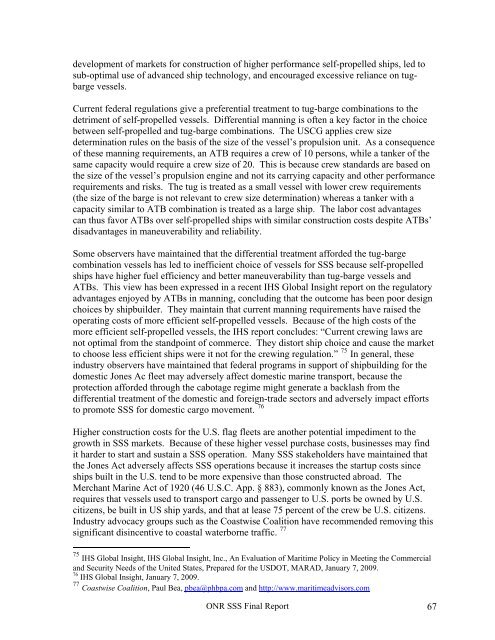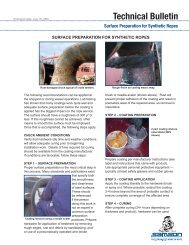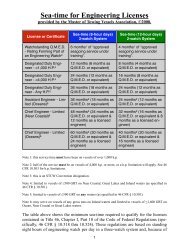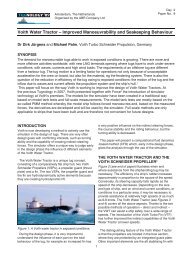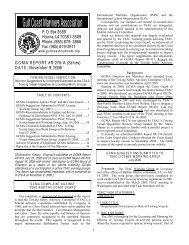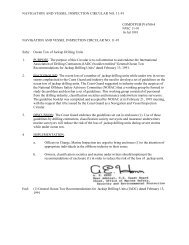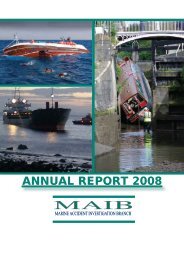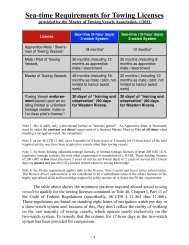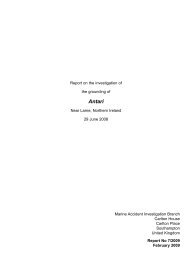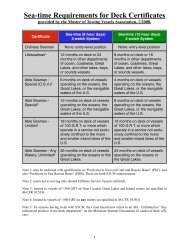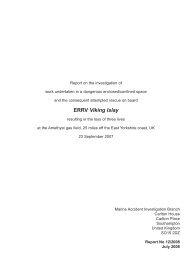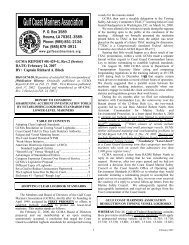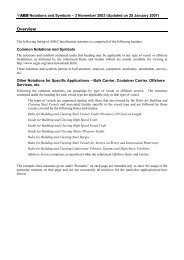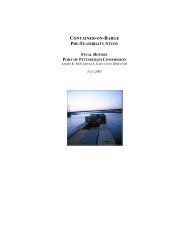Office of Naval Research - National Transportation Library
Office of Naval Research - National Transportation Library
Office of Naval Research - National Transportation Library
You also want an ePaper? Increase the reach of your titles
YUMPU automatically turns print PDFs into web optimized ePapers that Google loves.
development <strong>of</strong> markets for construction <strong>of</strong> higher performance self-propelled ships, led tosub-optimal use <strong>of</strong> advanced ship technology, and encouraged excessive reliance on tugbargevessels.Current federal regulations give a preferential treatment to tug-barge combinations to thedetriment <strong>of</strong> self-propelled vessels. Differential manning is <strong>of</strong>ten a key factor in the choicebetween self-propelled and tug-barge combinations. The USCG applies crew sizedetermination rules on the basis <strong>of</strong> the size <strong>of</strong> the vessel’s propulsion unit. As a consequence<strong>of</strong> these manning requirements, an ATB requires a crew <strong>of</strong> 10 persons, while a tanker <strong>of</strong> thesame capacity would require a crew size <strong>of</strong> 20. This is because crew standards are based onthe size <strong>of</strong> the vessel’s propulsion engine and not its carrying capacity and other performancerequirements and risks. The tug is treated as a small vessel with lower crew requirements(the size <strong>of</strong> the barge is not relevant to crew size determination) whereas a tanker with acapacity similar to ATB combination is treated as a large ship. The labor cost advantagescan thus favor ATBs over self-propelled ships with similar construction costs despite ATBs’disadvantages in maneuverability and reliability.Some observers have maintained that the differential treatment afforded the tug-bargecombination vessels has led to inefficient choice <strong>of</strong> vessels for SSS because self-propelledships have higher fuel efficiency and better maneuverability than tug-barge vessels andATBs. This view has been expressed in a recent IHS Global Insight report on the regulatoryadvantages enjoyed by ATBs in manning, concluding that the outcome has been poor designchoices by shipbuilder. They maintain that current manning requirements have raised theoperating costs <strong>of</strong> more efficient self-propelled vessels. Because <strong>of</strong> the high costs <strong>of</strong> themore efficient self-propelled vessels, the IHS report concludes: “Current crewing laws arenot optimal from the standpoint <strong>of</strong> commerce. They distort ship choice and cause the marketto choose less efficient ships were it not for the crewing regulation.” 75 In general, theseindustry observers have maintained that federal programs in support <strong>of</strong> shipbuilding for thedomestic Jones Ac fleet may adversely affect domestic marine transport, because theprotection afforded through the cabotage regime might generate a backlash from thedifferential treatment <strong>of</strong> the domestic and foreign-trade sectors and adversely impact effortsto promote SSS for domestic cargo movement. 76Higher construction costs for the U.S. flag fleets are another potential impediment to thegrowth in SSS markets. Because <strong>of</strong> these higher vessel purchase costs, businesses may findit harder to start and sustain a SSS operation. Many SSS stakeholders have maintained thatthe Jones Act adversely affects SSS operations because it increases the startup costs sinceships built in the U.S. tend to be more expensive than those constructed abroad. TheMerchant Marine Act <strong>of</strong> 1920 (46 U.S.C. App. § 883), commonly known as the Jones Act,requires that vessels used to transport cargo and passenger to U.S. ports be owned by U.S.citizens, be built in US ship yards, and that at lease 75 percent <strong>of</strong> the crew be U.S. citizens.Industry advocacy groups such as the Coastwise Coalition have recommended removing thissignificant disincentive to coastal waterborne traffic. 7775 IHS Global Insight, IHS Global Insight, Inc., An Evaluation <strong>of</strong> Maritime Policy in Meeting the Commercialand Security Needs <strong>of</strong> the United States, Prepared for the USDOT, MARAD, January 7, 2009.76 IHS Global Insight, January 7, 2009.77 Coastwise Coalition, Paul Bea, pbea@phbpa.com and http://www.maritimeadvisors.comONR SSS Final Report 67


